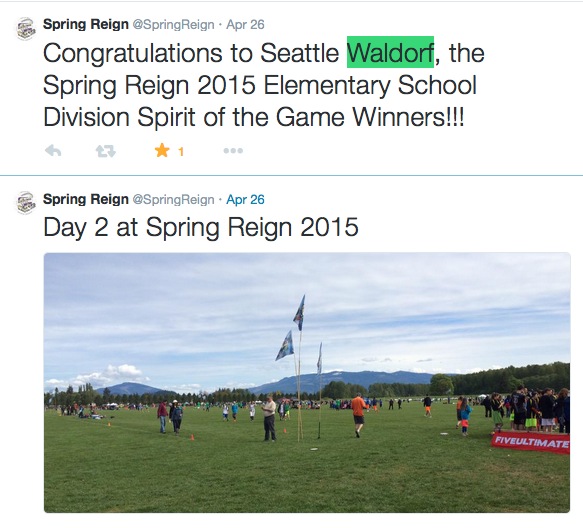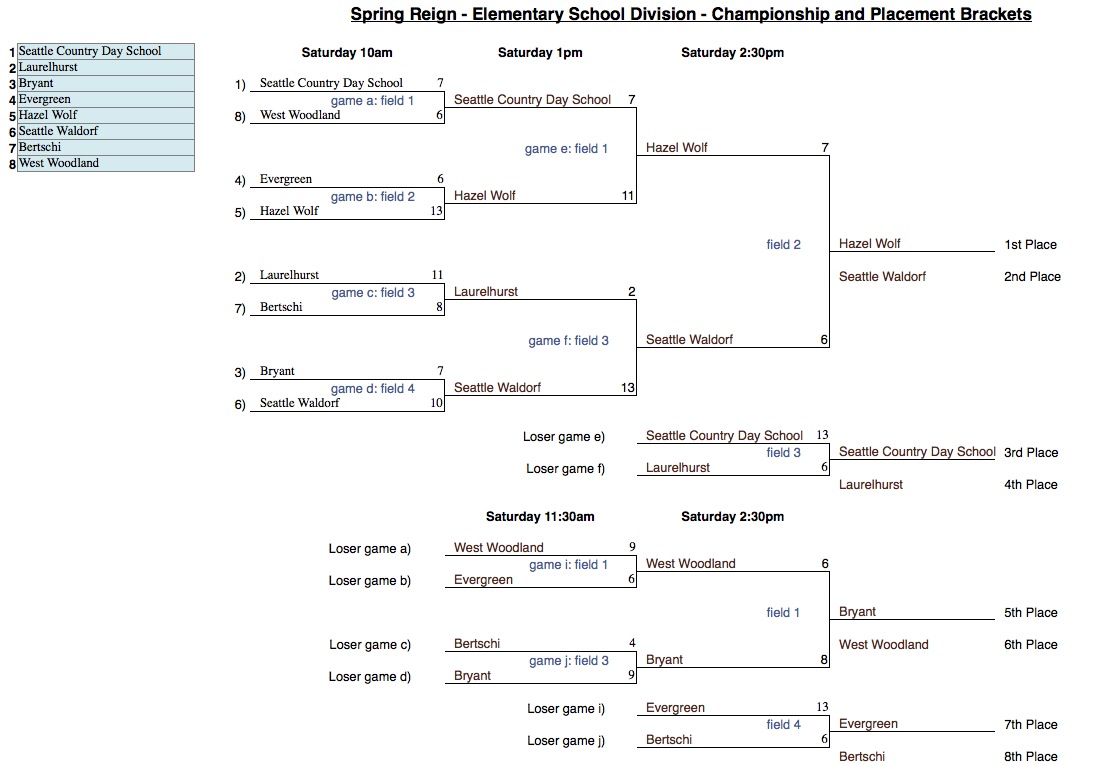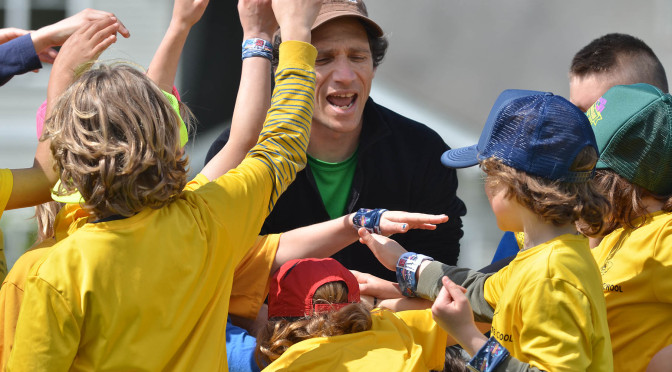Notes from the mandatory pre-season meeting run by Jude Larene, Youth Coordinator for Disc Northwest, on Wednesday, March 2, 2016 from 6-7:30. Impressively the number of teams has increased by ~20% this year (including 5 new teams within Seattle) — the fastest growth of all the youth spring leagues run by DiscNW. The meeting was attended by ~40 coaches, as well as Jude and the DiscNW Account Manager, Kate Speck. A highlight was receiving 5 free J-star 140-gram discs with an entrancing rainbow print of the DiscNW logo!

Here is a (low quality) audio recording of the meeting…
Jude on spring season orientation
- Private Facebook group: DiscNW youth coaching forum
- 11th edition rules
- Great app Ultimate Toolbox which lets you search rules via keyword
- (Jude also likes the Ultimate Playbook app. There are other ultimate apps…)
- No zone; no foot blocks
- Gender ratio
- Always at least 3 girls on the team in 7v7
- In 5v5 teams, offense chooses 3:2.
- Goal is to ensure equal playing time for girls and boys
- Jude’s team has an all-girl line
- Non-contact sport
- Encourage egalitarian subbing (no “kill lines”)
- Kids make the calls (coaches need to educate parents about this)
- Coaching Code of Conduct (Archived PDF of 2015-2016 DiscNW Coaching Code of Conduct)
- Revised last year after a lot of work
- Please read it before you sign it! (Feedback is very welcome)
- Consider the role you play as a coach in the lives of your players
- Set the coaching bar very high!
- You may also need to sign a coach’s liability waiver
- Spirit scores
- Average will be visible after 3rd week of play
- Please enter after each game, along with point score
- Get your team together at end of game and ask their opinion
- Provide feedback to the opposing coach via on-line form
- Score of 2 or 1 will require a comment this year; please provide a detailed explanation; Jude will contact the other team and help educate.
- If you can’t field a team for a Saturday game, please notify other team and Jude by Thursday
- Games to 11; 75 minutes; hard cap at 60 minutes.
- Only one field marshall hired for whole league!
- So, don’t expect timing horns (except at Magnuson); bring cones & keep time; know field dimensions (It’s OK with Jude if agree with other coach on smaller field, e.g. in high winds!!)
- Send responsible high school seniors to Jude to be additional marshalls!
- Please manage your own lost and found items (use Facebook group if necessary, not Jude!)
- Weather hotline
- Grass fields often get rained out
- At bottom of DiscNW web site
- Rainout Hotline: 206-504-DISC (3472)
- DiscNW Twitter feed can also often helpful, but sometimes not as updated as hotline
Kate on rosters & waivers
- Hard copy hand-out
- Minimum roster requirement is 3 girls and 4 boys (by Saturday deadline)
- There is sometime a ~1-2 hour delay between roster additions and waiver availability
- Advice if you are still placing kids (e.g. by skill) onto teams: put them all on one roster so they can sign waivers, then re-organize later.
- Paper waivers can be scanned and emailed, or snail mailed; be sure to use current version of waiver!
- Encouraged but not required: Have medical authorizations on hand; there is a template on the DiscNW web site
- Report incidents to Jude so he can check in and utilize DiscNW insurance coverage (can help improve access for future emergencies)
7pm
Jude on other topics
- J-star discs (one for free to each coach tonight!)
- Can get thumb further on top to help stabilize forehand
- New throwers have a lot of success with them
- May be less stable in high winds
- Kids may develop better form and throwing mechanics using smaller discs
- Buy more (rainbow!) for ~$7 through Disc NW
- Vision is for all 3rd and 4th grade teams to use
- If you like them want more, there are some emerging options for buying J-star discs in bulk (but they’re much less pretty than the DiscNW ones)
- Issues with our growing youth population
- Field access
- Coach shortage
- If one coach of multiple teams needs sequenced games in one location, it increases scheduling challenges
- Working on Coach Development Program (but may be ~5 years behind)
- May need to make league changes
- E.g. go to 5v5 in elementary
- fixes field problem by allowing
- but requires even more coaches
- E.g. go to 4v4 to for gender equality
- As one of biggest youth program in world/U.S. we have a chance to influence
- E.g. go to 5v5 in elementary
7:30 end
- More growth and teams will require more financial aid to maintain access for all
- Save the date and start planning bid items — 2016 Fall Bid is Saturday Nov 12 is Fall Bid
Questions:
- Are there AEDs available at major fields like Magnuson?
- Phillips deal through Michael Lapin on AEDs for kids (cardiac risk is relatively low for elementary students; risk increases dramatically around grade 9)
- John Leahy: is going to 5v5 a sacrifice or not?
- Jude personally thinks it works better for elementary kids
- Scores are higher; more touches per game; more success
- Jenn
- voluntarily signed up new 4th graders
- expectation is that girls will have a more equal experience
- Shannon’s 5v5 fall league packed a lot of kids onto the Roosevelt field
Ideas:
- What about playing on other days of week, e.g. after school?
- Could elementary teams play in other seasons? (Conflict with soccer?)
- Field advocacy group (in 80s?) used to go to city council meetings and wave discs around (John Beal is still at Seattle City Parks)
- Jude: City wants to put turf only where lights already exist (due to NIMBY light pollution concerns)
- Sometimes less is more
- Maybe 3 game tournament once a month is as good as weekly Saturday games
- Do playoffs make sense for elementary school?
- Maybe play 2 weeks out of 3? Weekend conflicts are tough, e.g. jazz
- Fridays? Some elementary soccer teams like a Friday evening practice
- Could fields along I-5 corridor expand capacity (e.g. Shoreline)?




